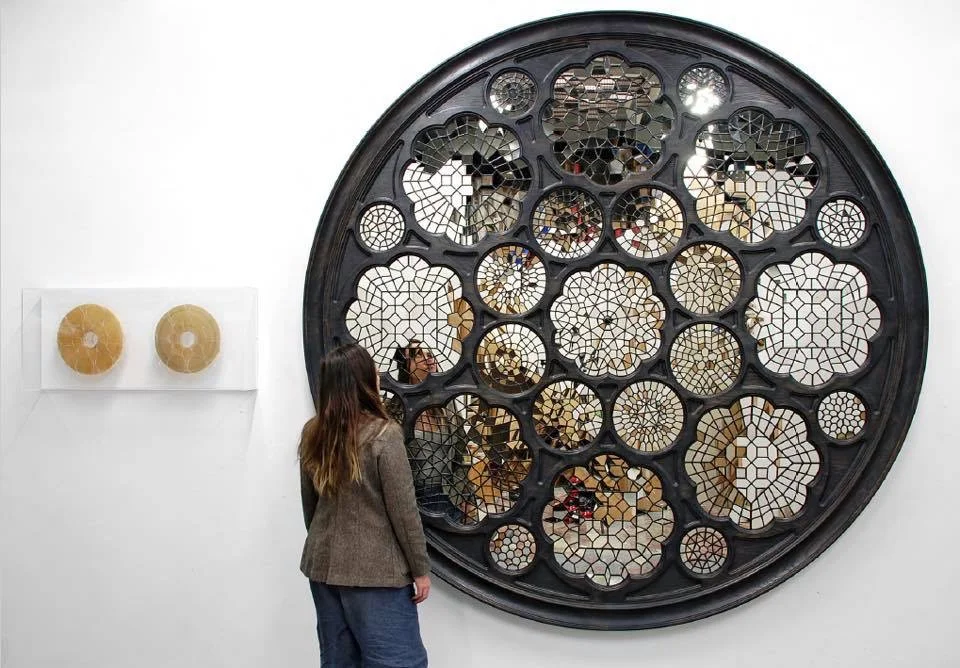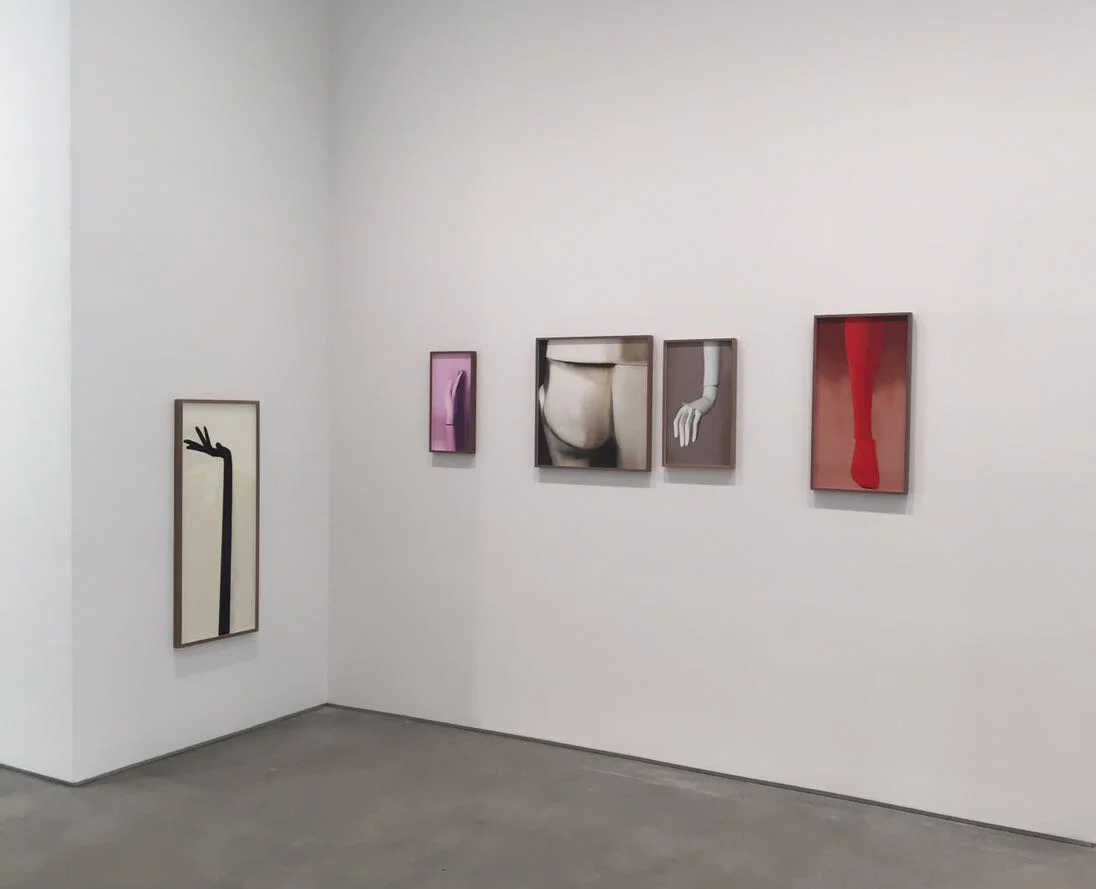Greg Rook Advisory is delighted to be working with the estate of Clyde Hopkins. As a painter and an educator Clyde had a profound and lasting influence on all those around him - an influence which continues to be reassessed with his recent inclusion in the Tate Collection. As the weight and significance of his work is brought to light through exhibition and publication, it becomes increasingly clear that his contribution to contemporary painting, and British abstraction in particular, was extraordinary.
A Decent Proposal
WHY BUY CONTEMPORARY ART?
Neil Hamon, Transfigured Night (In-through-and-out-of-itself).
Part 1: Handmade mirror elements created using silver extracted from an original 16mm print of George A. Romero’s film ‘Night of the Living Dead’ in Lead and Oak frame.
Part 2: Stripped bare 16mm acetate film on two reels in acrylic case.
Part 1: 265cm x 265cm x 10cm
Part 2: 102cm x 44cm x 17cm
2014
BEING A COLLECTOR
Recently a new client asked me to look at a particular artwork that was being sold at a local gallery. I went to see the work and I had to admit that I was not enthused. It was being sold by the kind of chain gallery that you find in Mayfair, Marlow and Tunbridge Wells. The kind of gallery that caters for wealthy customers with walls to fill, and the work they sell is more luxury good than fine art. They’re interested in the sale rather than the quality of the art they sell.
The work I was being asked to review had no real artistic merit. The press release for the artist made outrageous claims, which would have been false if they’d made any art historical sense. But what surprised me most was that they were selling these relatively small paintings for thousands. For less you can buy elsewhere a beautiful piece by the likes of Prunella Clough or Neil Tait or Luca Bertolo - intelligent, thoughtful artists with institutional pedigree. Their work will repay time and thought and be a good or possibly excellent investment.
Low culture can be as relevant as high culture. If you want to read Mills & Boon that’s OK - it only costs a few pounds and is consumed and done. If you secretly quite like Little Mix’s latest album, that’s fine - it’s free with a Spotify subscription. But an artwork is expensive and lives with you and on your wall for years. It is a very different kind of cultural, emotional and public investment and you don’t need to pay thousands for some derivative “decoration” when you can take some time to think, learn or be guided towards work that will reward in all sorts of ways.
There are certain facts that I can highlight in order to show when a gallery, such as the one my client directed me to, is exaggerating the quality of their merchandise. In this case I was able to show the same artist’s work selling at auction only a few months earlier for a fifth of what was being asked for by the gallery. Of course resale value is not all that makes a work valuable, but outside the persuasive atmosphere of such high street ‘high end’ galleries, this work is worth very little in every sense. The experience begins and ends with the purchase.
Understandably most people don’t appreciate having their taste questioned, but you don’t expect to be able to speak another language without a few lessons, or master an instrument without years of practice, so you shouldn’t expect to be able to judge what constitutes great contemporary art without some guidance and education. The conversation around contemporary art has been expanding for decades and you can’t expect to jump in and immediately understand what is being discussed. Time and knowledge is required to be an astute collector. It is easy to make mistakes when there is so much art about and so many unscrupulous galleries pushing their wares.
At GRA, as an advisor with a background as an artist and a lecturer, I have no wares, no agenda and I give you time and knowledge. I present the art that I know to be critical and from artists of real merit. For those who do take those first steps into this art world, as collectors and investors, they find it is an endlessly fascinating and rewarding place.
The Exponential Benefits of Truly Contemporary Art
Art at Home and Work
Those artists who are of particular interest to me are those who are under the radar, shown in obscure places, or not show at all. And buying these near emerging or overlooked artists is both really important and incredibly worthwhile.
Firstly, they need the money - they are inevitably not wealthy and each sale enables them to make more work - this kind of patronage and support has a long and venerable cultural history and is mutually and socially beneficial.
Secondly, each time you buy their work, add it to collections and enable them to show again, you are increasing their profile, thereby causing the very thing that both you and they want. Artworks and artists partly gain their credibility through the collections they're held in and the exhibitions that they are part of. It improves their provenance. If you wish to raise the profile of an artist that you are interested or invested in, then to show them in exhibitions and collections with artists that already have recognition is invaluable. You can help create the very recognition that you hope the artist will gain.
If there is any need for intelligent and thoughtful art in your home or offices then please contact Greg Rook Advisory. I have no doubt that great, contemporary art work would benefit your family, staff and clients as well as the exhibiting artists.
"Greg's insights enabled us to reinvigorate our portfolio with confidence and support some exciting new talent." Tom Hall, Chairman Pax Holdings Ltd.
"GRA is excellent at discovering under the radar artists whose work is available at reasonable cost and who, we believe, stand a good chance of increasing in value due to their quality." Howard Bilton, Chairman Sovereign Art Foundation
Art Basel Hong Kong
Avoiding the mediocre
Each month I have been sending the collectors I work with a selection of work from artists who I think are interesting, who are acclaimed by their contemporaries and who I believe are good long term investments.
There is such an enormous volume of mediocre and derivative art pushed at fairs and available from commercial galleries - art which is just as expensive as genuinely good art but which relies for its interest on a gimmick, or just the display of a little skill - that anybody who does not spend a lot of their time looking at art can be easily confused as to what will really reward years of looking and be a solid, and perhaps spectacular, investment. For those with the time to look then underneath the world of high street mediocrity and decoration lies a world of intelligent and progressive art which is affordable and delivers as an investment and as an enlightening cultural artefact.
Last month the selection of artists I recommended comprised mainly of relatively established artists whose prices have not yet sky-rocketed. This month I have focused on lower priced and less established artists - offering greater risk, but greater potential return. Most importantly all the artists suggested are making beautiful, intelligent, peer reviewed and engaging work.
Please contact me if you would like to discuss suggestions.









